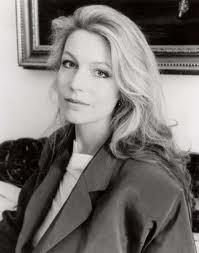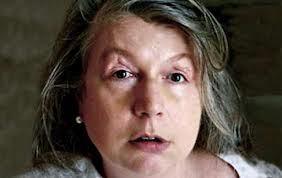This is Candia McWilliam in the late 1980s when she was at the height of her success as a literary novelist.

This is Candia McWilliam today, after years of struggling with alcoholism, an unresolved personality disorder and functional blindness through blepharospasm, a rare condition in which the sufferers’ eyelids close uncontrollably although their sight is not impaired.

What To Look For In Winter: A Memoir in Blindness is an account of a self laid bare in all her pain and bewilderment at how many wrong turns her life seems to have taken, and her struggle to make sense of these crises. It is a fascinating and strange book, exquisitely written, about a woman who shows both profound insight and remarkable courage coupled with an inability to master her negative emotions and a terrible fear of tackling herself. It is essentially the story of how we are compelled to recreate the situations that cause us most pain, if we persist in leaving them unexamined and unresolved.
She was born an only child into a troubled marriage; her mother was emotionally incontinent, her father emotionally constipated, although both were talented and capable people. When she was nine years old, her mother committed suicide, and although her account is opaque and allusive, I think she found her mother’s dead body. Whatever happened, there was enough absense of explanation, comfort and safety that the origin of McWilliam’s troubles is very easy to locate. Quite quickly afterwards her father remarried and started a new family, and from this moment on, the clever, sensitive and fragile Candia was living in a state of constant displacement. She became a ‘cuckoo child’, attaching herself to large, happy-go-lucky families, but it was not enough to make her feel the sort of acceptance she craved.
What I wanted was to belong, but I rushed to expel myself before I had even been sent out. My instincts and intuition were sound, but my use of them was not; I rushed to hurt myself before anyone else did.’
Sent away to school she proved to be academically gifted; she won the Vogue Talent Contest for 1970 and a place to Cambridge. Oddly enough, this is the toughest part of the memoir to read and I nearly gave up. Not because of the archly literary style, heavily influenced by Henry James (although it is notably torturous here), but because McWilliam is honestly recording a perspective on life that is all about glorifying glittering prizes, aristocratic titles and the sort of idle, shallow glamour that sits on a knife edge of pretension. It makes for queasy reading. But for the observant reader, it’s easy to see how McWilliam’s tendency to idealise has gone into overdrive, and married itself to a celebration of the sort of worldly success that actually means very little. Across this stretch of her life, she is weaving in and out of two marriages that fail, writing her novels that achieve a measure of acclaim and learning how to be a closet alcoholic. Self-sabotage is the name of the game, and an inevitable outcome of privileging the sparkly achievements over the altogether duller, tougher ones of accepting oneself and others, dealing with sorrow and frustration, learning to love the truth, and so on.
As she moves away from what seems to me a fundamentally dishonest period in her life, and towards the darkness she harbours all along, emerging in her ever-worsening alcoholism, the memoir becomes utterly compelling. Hot on the heels of alcohol dependency comes the condition that becomes the focus of the book (and somehow all the words we use figuratively about sight and insight gain hefty meaning in her narrative). She was a judge for the Man Booker prize in 2006 when she began to lose her sight and it took a long time for the correct diagnosis of acute blepharospasm to be made. It was a particularly cruel thing to happen to someone who found her sanity through reading and writing, and yet, given the lack of knowledge about the condition, and the suggestions of some that it had a psychosomatic element, McWilliam decided to write – or at least dictate – this memoir, in order to take a good long look at the circumstances that had brought her to this pass. She is very clear about her disinclination to do this and the figurative power of the blindness she embraced when she could still see. As someone who seems to have clung to comforting fantasies while letting a deeper truth destroy her, she makes a hypnotic subject for memoir, as her own growing self-awareness informs the reader’s progression through the story, and the writing, often frustratingly digressive, gradually gains the strength to face the reality of her character head on.
The second part of the memoir is a series of shorter pieces written while she was undergoing an experimental surgical treatment for her eyes. Doctors harvested tendons from her legs and used them to pin her eyelids open, a process that was both extremely painful and far from easy. Accompanying it are analyses of her character and her feelings that are disarmingly honest and unforgiving. Low self-esteem to the point of self-hatred is the dominant emotion:
I sense myself as a disaster in the room, as though someone has let in a maimed domestic animal and half-killed it, for its own respite, and its fur and blood are settling in the unhappy air around it.’
Undoubtedly her situation at this point is pretty awful; she is clearly still in love with her second husband, from whom she is separated. He now lives happily with another woman (and puts Candia up regularly when she needs rest after operations). She feels she has failed all her early promise, and is caught in a coffin of a body, fleshy and heavy, sightless and painful. The sense in the narrative of insufficient love is pervasive and terrible, as is her conscious searching out of ways to flagellate her already raw emotions. Yet the truthfulness of her narrative shows the reader that she is in fact surrounded by family and friends who love her and are ready to do all they can for her. This is the paradox of low self-esteem; those who refuse to believe they are lovable regularly insult all the people who love them.
The memoir ends on a tentative note of optimism, with her sight restored and her commitment to writing, at least, offering a valuable lifeline. Given how amazingly good the writing of this narrative is, that’s surely a plus and a reason for hope. This is an excruciatingly honest memoir that is at times infuriating, at times exquisite, and as such creates, in form as well as content, a faithful portrait of its author. If that’s so then the way forward for Candia McWilliam is to figure out what’s really important and chuck out the rest – for the main flaw of the book is its tendency to include much that is extraneous. As a symphony of human suffering, I doubt there is another book out there to match it.
